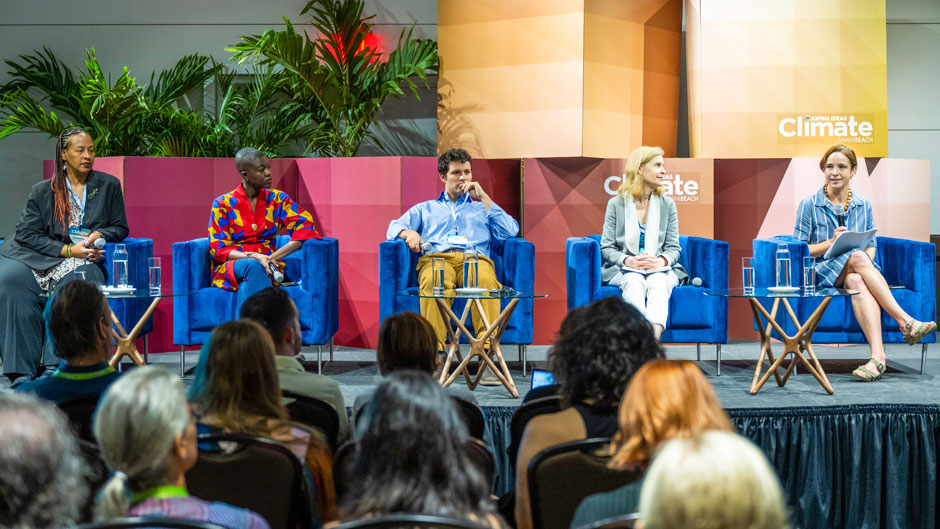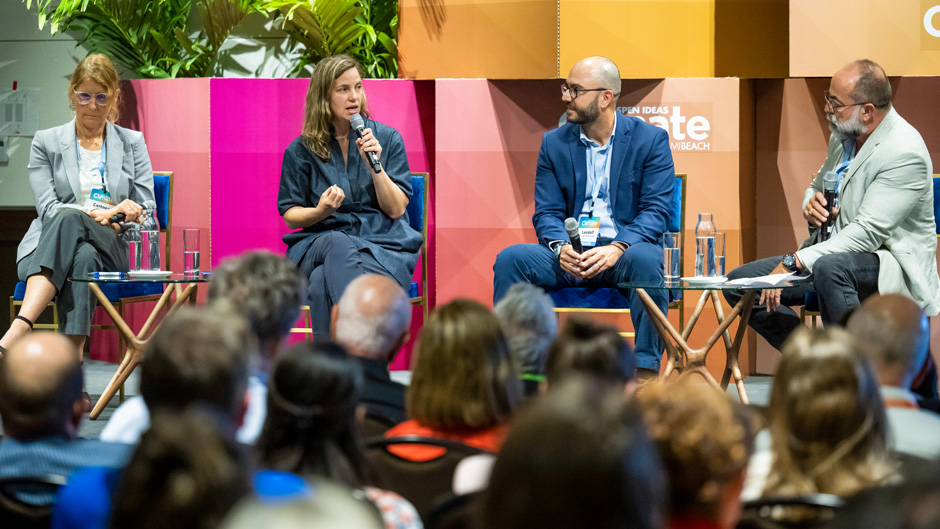Drones that are being used to reforest areas of California razed by wildfires. A growing momentum around the aquaculture industry to create sustainable, wholesome seafood that will feed humanity. And a recent opening of the tallest onshore wind turbine in Bristol, England, to generate power.
These were just a few ways companies and communities are trying to adapt to climate change and improve the world that were offered at the second annual Aspen Ideas: Climate 2023 conference happening this week in Miami Beach, Florida. The event, which continues through Wednesday, is drawing 2,500 professionals and 300 speakers from across the globe to the Miami Beach Convention Center and the New World Center, including scientists, climate industry leaders, politicians, journalists, artists, and even people like mountain climber, Tommy Caldwell.
University of Miami faculty members and alumni are speaking and presenting at the conference. And some participants who signed up, including journalists, will tour the Alfred C. Glassell Jr. SUSTAIN wind-wave tank and the Rescue a Reef lab at the Rosenstiel School of Marine, Atmospheric, and Earth Science on Tuesday and Wednesday.
Also on Tuesday, School of Architecture Dean Rodolphe el-Khoury—who also serves as interim director of the Climate Resilience Academy—and Katharine Mach, professor of environmental science and policy, moderated two panels. In addition, Landolf Rhode-Barbarigos, an assistant professor of engineering, as well as Daniel Benetti, professor of marine biology and ecology and director of the Rosenstiel School’s aquaculture program, participated as speakers in two hour-long panels.
Mechanical and aerospace engineering professor GeCheng Zha also presented at the Climate Solutions Showcase. And on Wednesday night, Gloria Estefan, University alumna, trustee emeritus, and Grammy-award-winning singer, songwriter, and actress will interview Vice President Kamala Harris about her administration’s climate policy progress.

Katharine Mach, far right, professor of environmental science and policy at the Rosenstiel School of Marine, Atmospheric, and Earth Science, led a panel discussion.
Mach led the discussion in a Tuesday morning session titled “Come Hell or High Water,” about the process of managed retreat, where the Federal Emergency Management Association, and other entities, are paying people to move away from coastal areas where sea level rise and flooding are threatening the safety of their homes. However, in the process of trying to keep these people safe, panelists explained that these policies often uproot people—particularly minorities and Indigenous people—who may have lived in the region for hundreds of years. As a result, these displaced residents often struggle with the transition, both financially and emotionally.
In an afternoon session led by el-Khoury called “Where Buildings Meet Breakwaters: Design Solutions for Resilient Coastlines,” Rhode-Barbarigos explained how he and a team of faculty members created a design for hybrid reef structures called ECoREEF, which were submerged off Miami Beach last week.
In addition, Kate Orff, an architecture professor and co-director of the Center for Resilient Cities and Landscapes at Columbia University, spoke about a project she worked on in New York Harbor called Oyster-tecture, which is helping to restore some of the ecosystems damaged in Hurricane Sandy and is offering some protection for the coastline around New York City. Orff helped design oyster reefs that now serve as living breakwaters. At the end of the session, Rhode-Barbarigos was peppered with questions from interested local leaders. He said it was a pleasure to participate as a speaker in the conference and he hoped to attend a session on Wednesday.
“It’s important to be in these discussions because the University of Miami is located in South Florida, which is ground zero for climate change, and we need to showcase the great work we are all doing in this arena,” Rhode-Barbarigos said. “This conference is a great platform, with a lot of great ideas and very interesting discussions, and we all hope that by attending we will make connections with others that will enable our projects and innovations to rise to the next level and make an impact.”
Meanwhile, Benetti joined the roundtable “Clearing the Pipeline for Investment in Sustainable, Values-based Blue Food Production,” on Tuesday afternoon, when panelists spoke about the thriving aquaculture industry and its challenges. Aquaculture offers an alternative to shrinking wild fish populations because these facilities can grow fish for human consumption. According to Benetti, today more than half of the seafood sold for human consumption is grown in aquaculture facilities, so he was glad that participants at the conference were supportive of the practice.
“One major point of progress that we have achieved recently is that most people now understand that it’s important to develop sustainable aquaculture, so they are joining academic and industry leaders,” Benetti said. “I’m happy to see that representatives from government agencies and the nonprofit sector are on the same page that we must develop sustainable aquaculture. It’s the only alternative to the dwindling wild fish supply and growing demand for sustainable seafood in the future.”
The Aspen Ideas Climate conference began last year in Miami Beach as a collaboration between Miami Beach Mayor Dan Gelber and his friend Dan Porterfield, who is also the president of the Aspen Ideas Institute, which aims to ignite human potential, build understanding, and offer new possibilities in free, just, and equitable societies. They plan to host the event annually.
“What makes this a truly novel summit is that because of your diversity, we will work on solutions from an enormous array of perspectives,” Porterfield said to the audience. “That’s essential because the climate and energy questions before us are deeply complex and cannot be solved overnight.”

